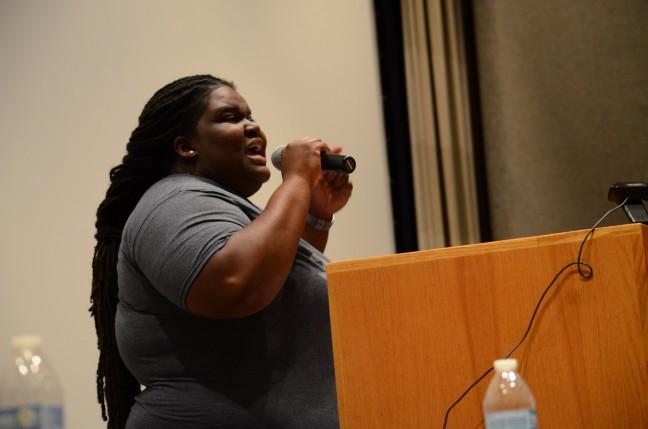Members of the Young, Gifted and Black Coalition engaged in a debate with Dane County sheriffs on whether renovations to the Dane County Jail will ensure the safety of vulnerable people in Madison’s community Thursday.
M Adams and Nino Rodriguez of YGB debated Sheriff David Mahoney and Douglas Kramer at the Elvehjem building.
County officials said Dane County Jail renovations are proposed to resolve life and safety issues, such as increasing the number of beds for mentally ill inmates and fixing faulty locks.
Mahoney said it was Dane County’s moral and ethical responsibility to consider what happens when the most vulnerable in the community are incarcerated. Renovations are important to meet legal, moral and ethical requirements for a safe and humane environment for those arrested or serving sentence in the Dane County Jail, he said.
The safety of those incarcerated is in jeopardy because the jail is lacking services and programs, Mahoney said. On two occasions, inmates have been locked in cells for over three hours because of problems with the manual opening system, he said.
Mahoney also said the jail lacks adequate special needs housing for those with mental illnesses and 40 to 50 inmates that have personal needs are often separated in solitary confinement. There is also limited programming to address core reasons that inmates enter the Dane County Jail in the first place, he said.
Madison feels exempt from national and state violence, Adams said. Structural racism and racial disparities and disproportionality are a form of state violence, she said.
“In Madison we are having a human rights crisis as a black community, therefore we are a vulnerable community,” Adams said.
Madison needs a human rights solution and jail is not a solution, Adams said. YGB asks for the demographic of those incarcerated to reflect the demographic of the community, she said.
African Americans make up 5 percent of the county and should make up 5 percent of those incarcerated, instead of nearly 50 percent, Adams said.
Adams said YGB demands the release of 350 black inmates who are imprisoned for crimes of poverty. There are people who have been locked in, locked up and locked out of society in multiple ways and a new lock will not create safety, she said.
“I am proposing that there be a release of the 350, that we as a county decide to be different than Ferguson, decide to be different than Chicago, Milwaukee and others by making structural choices to end structural violence and state violence against those most vulnerable here in the incarceration system,” Adams said. “The sheriff is proposing renovation.”
Dane County needs a substantial change to address the root problems with the way they care for the mentally ill, Kramer said.
The pain inmates suffer becomes Dane County’s responsibility when they are in custody and this pain qualifies as torture, Kramer said.
“We need to do the best job we can for all of our people,” he said. “The way we do that is put an equal amount of attention to addressing poverty and homelessness.”
Jailing the mentally ill makes their symptoms worse, Kramer said. One fourth of those incarcerated have serious mental illnesses and for their own protection, the only place to hold them is in solitary confinement, he said.
The community needs to create a movement from vulnerability to safety and from structural racism to racial equity, Rodriguez said. Two of the major reasons inmates stay in jail is due to policies related to bail and home detention, he said.
“There are practical policy changes that this county could make, that will make it possible to release the 350,” Rodriguez said. “[We need to] increase racial equity and reduce the need for jail space or renovation. [We need to] take jail renovations off the table and build the people, not the jail.”


